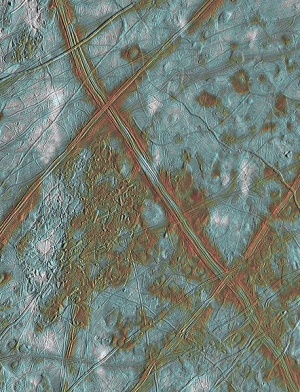Aurora is on version 2.5.0 C#, available at the Aurora Forums.
Contact Erik on the forum for a wiki account.
Ruins
Ruins are the rare and valuable remains of ancient civilizations that appear on your worlds. Alien ruins can be exploited to recover installations and technologies, including some technologies not discoverable by any other means.
Discovery
Geological survey conducted on terrestrial worlds, may reveal abandoned alien ruins on that world. The chance of alien ruins is redetermined during new galaxy creation. It is normally 20% for any terrestrial world, terrestrial moon or small terrestrial moon with gravity > 0.4G and temperature between 200K and 360K (about -73C to +87C).
Once discovered the ruins will show on the System Map, Display2 tab. Ruins appear to be classified according to two values, Condition and Size.
- Possible Ruins categories
- [1]
- Destroyed Outpost
- Ruined Outpost
- Ruined Settlement
- Ruined Colony
- Ruined City
- Damaged Installation
- Abandoned Installation
- Partially Intact City
- Deserted Intact City
- Deserted Intact Cities
Both Size and Condition appear to modify how many installations are able to be recovered, with larger and more intact ruins having more potential installations.
Study
Discovered ruins need to be studied by Xenology team. Once the team arrive on site it will began the long process (up to years) to discover all there is to know about the Ruins and the empire they belonged to. The higher the tech level (Tx[where x is the level of their tech]) the more advanced ship components you may find. However, the level of the ruins does not affect the level of technology you may find.
After your Xenology team is done deciphering the ruins, bring in Construction brigades to dig up and find the use-able materials, facilities, technologies, etc. Ruins will still generate trade products for the civilian economy after discovery and extraction however.
Recovery
Ruins can contain resources such as fuel, minerals, facilities, ship components, technology one level higher than your current level in that area or even advanced technologies not discoverable by any other means. However, beware there is a down side to digging up ruins however; you may stumble upon some FUN, so bring up backup.
To attempt recovery, studied ruins need to be excavated by Construction Brigades. When you have at least one construction brigade on site where you have deciphered the ruins, you will eventually start to recover the ruins.
There are three outcomes:
| Not Successful | (Construction Brigade Name) has attempted to recover an alien installation on (body) but the installation was beyond repair. |
| Successful | (Construction Brigade Name) has recovered an abandoned (installation type) on (body) |
| Vault | (Construction Brigade Name) has disturbed an underground vault on (body) that contains hostile robotic soldiers |
Recovery mechanics
Each production cycle, an Construction Brigade has a chance to make a recovery roll on an installation. If this roll is unsuccessful, nothing happens. If it is successful, then there is a chance that the facility they recover is unable to be repaired. The chance of this happening determined by taking a random roll from 1-200 and comparing it to 200 - (Construction Brigade Morale + Xenology Bonus of the Brigade commander).
For example, a new Construction Brigade with morale of 100 and a Xenology bonus of 5% should have a success rate of (200 - (100 + 5))=95 versus a 1-200 roll, or about 52%. Since Construction Brigades can gain morale and bonus increase with each successful recovery, a seasoned Construction Brigade with morale of 118 and bonus of 22% might have a success rate of (200 - (118 + 22))=60 versus a 1-200 roll, or about 70%.
Once a successful roll takes place, whether an installation is recovered or not, the number of available installations to recover is reduced by one. If that leaves the available installations at zero, a message is generated stating that the ruins are fully exploited.
Recovery outcomes
Once an Construction Brigade successfully recovers an installation, a roll from 1-200 takes place to determine which installation is recovered.
| Number | Installation Recovered | Note |
|---|---|---|
| 1-11 | Minerals | Random quantities of one random mineral |
| 12-15 | Missiles | |
| 16-17 | Mass Driver | |
| 18-22 | Maintenance Facility | Random between 1-5 |
| 23-37 | Construction Factory | |
| 38-45 | Ordnance Factory | |
| 46-49 | Fighter Factory | |
| 50 | Commercial Spaceport | |
| 51-57 | Fuel Refinery | |
| 58-71 | Infrastructure | Random quantity |
| 72-76 | Deep Space Tracking Station | |
| 77-82 | Research Lab | |
| 83-87 | Terraforming Installation | |
| 88-94 | Fuel | Random quantity |
| 95-96 | Ground Force Training Facility | |
| 97 | Duranium | Random quantity |
| 98 | Neutronium | Random quantity |
| 99 | Sorium | Random quantity |
| 100 | Shipyard | |
| 101-150 | Mine | |
| 151-200 | Automated Mine |
List is from 3.3, no known changes since then. [2]
In addition, each time you recover a facility you have a chance to gain an un-researched tech, and the type of building determines what type of technology you will find when you find it. The chance is low for normal facilities and higher for Research Facilities.
For example, recovering a Mine could give you "Mining Production ## Tons", with the tech level being the next level that has not been fully researched.
Recovering a Research Facility may grant technology that cannot be otherwise researched, and is the only way of finding some technology.
